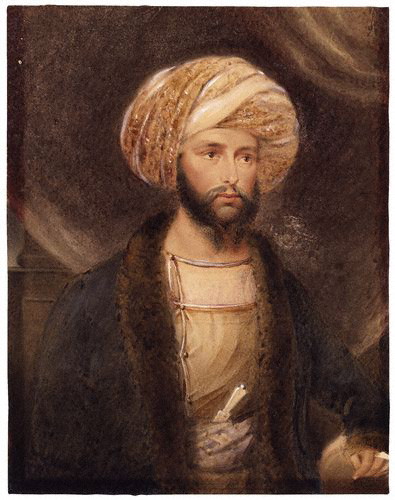Explore METUI's adventurous life as a Russian soldier in the Sikh army, his Kashmiri marriage, and his life in Lahore. Learn more about his unique journey.
OCHTERLONY, SIR DAVID (1758-1825), soldier and diplomat, son of David Ochterlony, was born at Boston, Massachusetts, on 12 February 1758. In 1777, he joined the service of the East India Company as a cadet. He served under Lord Lake in the battle of Delhi and was appointed British resident in 1803 at the court of Shah `Alam, emperor of Hindustan. In 1808, he was the garrison commander at Allahabad when he was ordered to advance to the Sutlej with a detachment to meet the Sikh troops in the cis Sutlej region. From 1809-14 he was agent to the Governor General at the Ludhiana Political Agency.
Explore Poona Residency Correspondence's rich accounts of British-Sikh relations, revealing pivotal historical events and key figures before 1800.
Discover the intrigue behind the 1847 Prema Plot, a conspiracy to overthrow British control in Punjab, spearheaded by Maharani Jind Kaur. Explore the untold story.
ABBOTT, SIR JAMES (1807-1896), British Resident\'s assistant at Lahore, capital of the sikh kingdom, after the first Anglo - Sikh war (1845-46), was born on 12 March 1807, the son of Henry Alexius Abbott. Passing out of the military college of the East India Company at Addiscombe, England, Abbott received commission as a second lieutenant in the Bengal artillery in 1823. In November 1830, he joined the army of the Indus, under Sir John Keane, for the invasion of Afghanistan. In 1842, he was appointed assistant to the British Resident at Indore.
Explore the 1848-49 Anglo-Sikh War II, marking British domination and the end of the Sikh Kingdom. Learn about strategies, resistances, and outcomes.
BHANA, BHAI, resident of Prayag (Allahabad), is listed by Bhai Gurdas, Varan, XI. 31, among leading Sikhs of the time of Guru Hargobind (1595-1644). As recorded in Bhai Mani Singh, Sikhan di Bhagat Mala, he asked the Guru to indicate the way to release. The Guru said, "Meditate always on Vahiguru and make honest work your daily habit."
Explore Bhista, the Muslim concept of heaven, its spiritual essence, and path to achieving it through self-comprehension and devotion.
CHATAR SINGH ATARlVALA (d. 1855), commander and provincial governor under minor Maharaja Duleep Singh, was the son of Jodh Singh Atarivala. Jodh Singh had joined the service of Maharaja Ranjit Singh in 1805 when he received large jagirs in the Pothohar country. On the death of his father in that year, Chatar Singh succeeded to the jagrrs, then amounting to over a lakh of rupees annually. He devoted most of his time to farming and kept generally aloof from state affairs during the reign of Maharaja Ranjit Singh. When after the assassination of his son, Maharaja Sher Singh, in September 1843, his daughter, Tej Kaur, was betrothed to Maharaja Duleep Singh, he came into prominence politically.
COUNCIL OF REGENCY. To govern the State of the Punjab during the minority of Maharaja Duleep Singh, two successive councils of regency were set up at Lahore the first functioning from 1844-46 and the second from 1846-49. After the assassination of Maharaja Sher Singh on 15 September 1843, Raja Hira Singh had won over the Khalsa army and established himself in the office of prime minister with the minor Duleep Singh as the new sovereign. But his rule was short lived, and he, along with his favourite and deputy, Pandit Jalla, was killed by the Army on 21 December 1844. MaharaniJind Kaur, who had an active hand in overthrowing Hira Singh, now cast off her veil and assumed full powers as regent in the name of her minor son, Duleep Singh.
- 1
- 2







